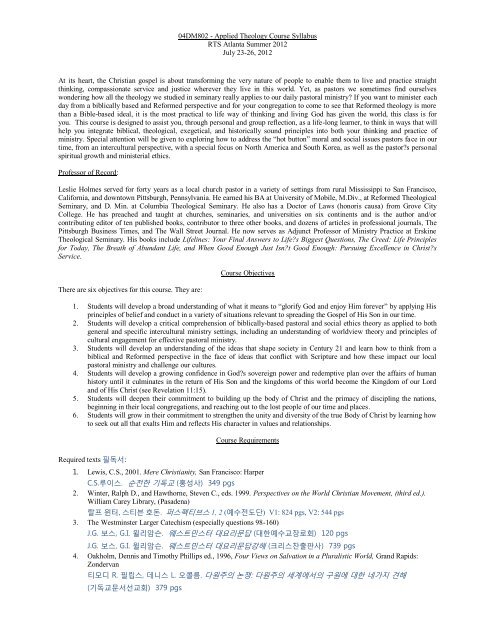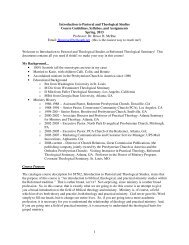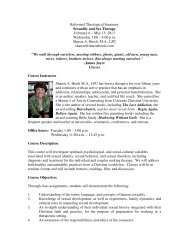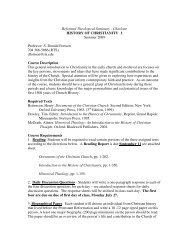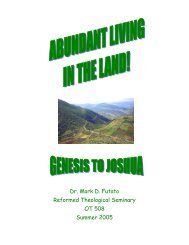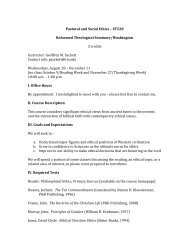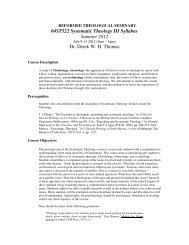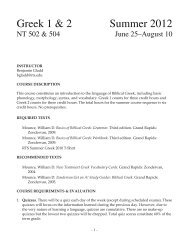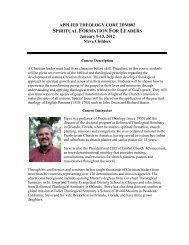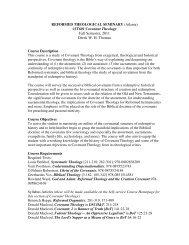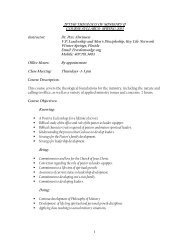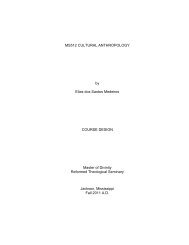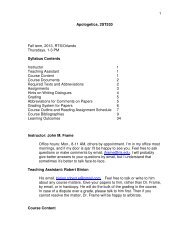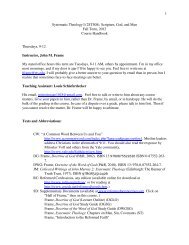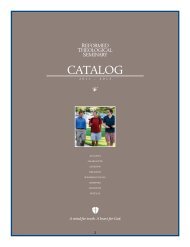04DM802 Applied Theology - Reformed Theological Seminary
04DM802 Applied Theology - Reformed Theological Seminary
04DM802 Applied Theology - Reformed Theological Seminary
Create successful ePaper yourself
Turn your PDF publications into a flip-book with our unique Google optimized e-Paper software.
<strong>04DM802</strong> - <strong>Applied</strong> <strong>Theology</strong> Course Syllabus<br />
RTS Atlanta Summer 2012<br />
July 23-26, 2012<br />
At its heart, the Christian gospel is about transforming the very nature of people to enable them to live and practice straight<br />
thinking, compassionate service and justice wherever they live in this world. Yet, as pastors we sometimes find ourselves<br />
wondering how all the theology we studied in seminary really applies to our daily pastoral ministry? If you want to minister each<br />
day from a biblically based and <strong>Reformed</strong> perspective and for your congregation to come to see that <strong>Reformed</strong> theology is more<br />
than a Bible-based ideal, it is the most practical to life way of thinking and living God has given the world, this class is for<br />
you. This course is designed to assist you, through personal and group reflection, as a life-long learner, to think in ways that will<br />
help you integrate biblical, theological, exegetical, and historically sound principles into both your thinking and practice of<br />
ministry. Special attention will be given to exploring how to address the “hot button” moral and social issues pastors face in our<br />
time, from an intercultural perspective, with a special focus on North America and South Korea, as well as the pastor?s personal<br />
spiritual growth and ministerial ethics.<br />
Professor of Record:<br />
Leslie Holmes served for forty years as a local church pastor in a variety of settings from rural Mississippi to San Francisco,<br />
California, and downtown Pittsburgh, Pennsylvania. He earned his BA at University of Mobile, M.Div., at <strong>Reformed</strong> <strong>Theological</strong><br />
<strong>Seminary</strong>, and D. Min. at Columbia <strong>Theological</strong> <strong>Seminary</strong>. He also has a Doctor of Laws (honoris causa) from Grove City<br />
College. He has preached and taught at churches, seminaries, and universities on six continents and is the author and/or<br />
contributing editor of ten published books, contributor to three other books, and dozens of articles in professional journals, The<br />
Pittsburgh Business Times, and The Wall Street Journal. He now serves as Adjunct Professor of Ministry Practice at Erskine<br />
<strong>Theological</strong> <strong>Seminary</strong>. His books include Lifelines: Your Final Answers to Life?s Biggest Questions, The Creed: Life Principles<br />
for Today, The Breath of Abundant Life, and When Good Enough Just Isn?t Good Enough: Pursuing Excellence in Christ?s<br />
Service.<br />
There are six objectives for this course. They are:<br />
Course Objectives<br />
1. Students will develop a broad understanding of what it means to “glorify God and enjoy Him forever” by applying His<br />
principles of belief and conduct in a variety of situations relevant to spreading the Gospel of His Son in our time.<br />
2. Students will develop a critical comprehension of biblically-based pastoral and social ethics theory as applied to both<br />
general and specific intercultural ministry settings, including an understanding of worldview theory and principles of<br />
cultural engagement for effective pastoral ministry.<br />
3. Students will develop an understanding of the ideas that shape society in Century 21 and learn how to think from a<br />
biblical and <strong>Reformed</strong> perspective in the face of ideas that conflict with Scripture and how these impact our local<br />
pastoral ministry and challenge our cultures.<br />
4. Students will develop a growing confidence in God?s sovereign power and redemptive plan over the affairs of human<br />
history until it culminates in the return of His Son and the kingdoms of this world become the Kingdom of our Lord<br />
and of His Christ (see Revelation 11:15).<br />
5. Students will deepen their commitment to building up the body of Christ and the primacy of discipling the nations,<br />
beginning in their local congregations, and reaching out to the lost people of our time and places.<br />
6. Students will grow in their commitment to strengthen the unity and diversity of the true Body of Christ by learning how<br />
to seek out all that exalts Him and reflects His character in values and relationships.<br />
Course Requirements<br />
Required texts 필독서:<br />
1. Lewis, C.S., 2001. Mere Christianity, San Francisco: Harper<br />
C.S.루이스. 순전한 기독교 (홍성사) 349 pgs<br />
2. Winter, Ralph D., and Hawthorne, Steven C., eds. 1999. Perspectives on the World Christian Movement, (third ed.).<br />
William Carey Library, (Pasadena)<br />
랄프 윈터, 스티븐 호돆. 퍼스펙티브스 1, 2 (예수전도단) V1: 824 pgs, V2: 544 pgs<br />
3. The Westminster Larger Catechism (especially questions 98-160)<br />
J.G. 보스, G.I. 윌리암슨. 웨스트민스터 대요리문답 (대한예수교장로회) 120 pgs<br />
J.G. 보스, G.I. 윌리암슨. 웨스트민스터 대요리문답강해 (크리스찬출판사) 739 pgs<br />
4. Oakholm, Dennis and Timothy Phillips ed., 1996, Four Views on Salvation in a Pluralistic World, Grand Rapids:<br />
Zondervan<br />
티모디 R. 필립스, 데니스 L. 오콜름. 다원주의 논쟁: 다원주의 세계에서의 구원에 대한 네가지 견해<br />
(기독교문서선교회) 379 pgs
5. Atkinson, David J. and David H. Field, ed., 1995. New Dictionary of Christian Ethics and Pastoral <strong>Theology</strong>,<br />
InterVarsity<br />
6. Bradshaw, Bruce, 2002. Changes Across Cultures, Baker<br />
7. McQuilken, Robertson, 1995. An Introduction to Biblical Ethics, (Second Edition). Wheaton: Tyndale<br />
8. Murray, John, 2001. Principles of Conduct, Eerdmans<br />
Evaluation:<br />
Reading: Students must read the required textbooks (10% of final grade)<br />
Class participation: Students must participate in class discussions and presentations (20% of final grade)<br />
Research paper: Each student is expected to prepare a twenty page paper on an actual personal or pastoral ethical issue that the<br />
student has faced and had to decide. This paper should be written in such a way as to preserve the anonymity of the church<br />
congregation and individuals involved unless prior written permission to do otherwise has been obtained by the student. This<br />
paper will take into account biblical grounds for ethical principles followed and the process by which the student reached and<br />
implemented the decision, as well as an assessment of the effectiveness and lessons learned through the process. (70% of final<br />
grade)<br />
Course subjects:<br />
Introductions and Course Orientation<br />
Part 1 - Understanding the forces that drive how people are thinking:<br />
A discussion of the world views that shape modern thinking:<br />
A. Post-modernism including Pluralism and Relativism<br />
B. Secularism<br />
C. Existentialism<br />
D. Humanism<br />
E. Hedonism<br />
Part 2 - Determining the forces that should drive our thoughts and actions as Christian leaders<br />
Part 3 - The role of the Pastor and the Church in light of these forces as it relates to:<br />
A. Human sexuality<br />
B. Abortion<br />
C. Marriage<br />
D. Divorce<br />
E. In-vitro fertilization<br />
F. Stem cell transplanting<br />
G. Euthanasia<br />
H. World economics<br />
I. Science<br />
J. The arts<br />
K. Literature and the media<br />
L. Government<br />
M. Other issues of particular interest to South Korean pastors and the South Korean Church<br />
In addition, special time will be given to discussion pertaining to the writing of your course research paper
Course:<br />
Professor:<br />
Campus:<br />
Course Objectives Related to DMin* Student Learning Outcomes<br />
<strong>04DM802</strong> <strong>Applied</strong> <strong>Theology</strong><br />
Dr. Robert Leslie Holmes<br />
Atlanta<br />
Date: July 23-26, 2012<br />
DMin* Student Learning Outcomes<br />
In order to measure the success of the DMin curriculum, RTS has defined the<br />
following as the intended outcomes of the student learning process. Each course<br />
contributes to these overall outcomes. This rubric shows the contribution of this<br />
course to the DMin outcomes.<br />
Rubric<br />
‣ Strong<br />
‣ Moderate<br />
‣ Minimal<br />
‣ None<br />
Mini-Justification<br />
Articulation (oral<br />
and written)<br />
Broadly understands and articulates knowledge, both<br />
oral and written, of essential biblical, theological,<br />
historical, and cultural/global information, including<br />
details, concepts, and frameworks<br />
Strong<br />
Students are required to write a course integration<br />
paper that must demonstrate their theology and the<br />
application of course content<br />
Scripture<br />
Significant knowledge of the original meaning of<br />
Scripture and the ability to apply Scripture to a variety<br />
of modern circumstances. This will include<br />
appropriate use of original languages and<br />
hermeneutics; and integrates theological, historical,<br />
and cultural/global perspectives.<br />
Strong<br />
Students are required to read material relating to<br />
personal spiritual growth and renewal and to be able to<br />
think biblically and critically about how the material can<br />
be used properly and effectively in their life and<br />
ministry.<br />
<strong>Reformed</strong><br />
<strong>Theology</strong><br />
Significant understanding of <strong>Reformed</strong> theology and<br />
practice, with emphasis on the Westminster<br />
Standards.<br />
Moderate<br />
Students will read and evaluate what <strong>Reformed</strong><br />
theologians and writers have to say about applying<br />
theology to the issues of our time.<br />
Sanctification<br />
Demonstrates a love for the Triune God that<br />
aids in the student’s sanctification.<br />
Strong<br />
Students will be helped to grow in and demonstrate<br />
love for God and other people by the application of<br />
God’s law and grace in the practice of ministry.<br />
Desire for<br />
Worldview<br />
Burning desire to conform all of life to the Word of<br />
God<br />
Strong<br />
The student will learn how to be used by God as an<br />
agent of growth and renewal in the lives of others.<br />
Winsomely<br />
<strong>Reformed</strong><br />
Preach<br />
Embraces a winsomely <strong>Reformed</strong> ethos. (Includes an<br />
appropriate ecumenical spirit with other Christians,<br />
especially Evangelicals; a concern to present the<br />
Gospel in a God-honoring manner to non-Christians;<br />
and a truth-in-love attitude in disagreements.)<br />
Ability to preach and teach the meaning of Scripture<br />
to both heart and mind with clarity and enthusiasm.<br />
Moderate<br />
Minimal<br />
This course will lay a firm foundation for the<br />
development of practical church-based ministries of<br />
spiritual growth, pastoral care, and Christian ethics.<br />
This course is designed to help and guide the student<br />
on applying theological principles both as a means of<br />
personal spiritual growth and helping others apply<br />
Christian faith to real life issues and situations.<br />
Worship<br />
Knowledgeable of historic and modern Christian<br />
worship forms and ability to construct and skill to lead<br />
a worship service.<br />
None<br />
Shepherd<br />
Church/World<br />
Ability to shepherd the local congregation; aiding in<br />
spiritual maturity, promoting use of gifts and callings<br />
and encouraging a concern for non-Christians both in<br />
America and worldwide.<br />
Ability to interact within a denominational context,<br />
within the broader worldwide church with significant<br />
public issues<br />
Strong<br />
Modern<br />
This course will lay a strong foundation for future<br />
studies in the dynamics of how the Gospel can be<br />
applied to bring spiritual growth and renewal in the<br />
lives of others.<br />
This course will lay a strong foundation for the practical<br />
development of church-based ministries of spiritual<br />
growth and renewal, especially for pastors,<br />
missionaries, and church planters.


